
Accept crypto with CoinGate
Accept crypto with confidence using everything you need in one platform.
What is a Proxy Server & How it Works: A Quick Set Up Guide 2025
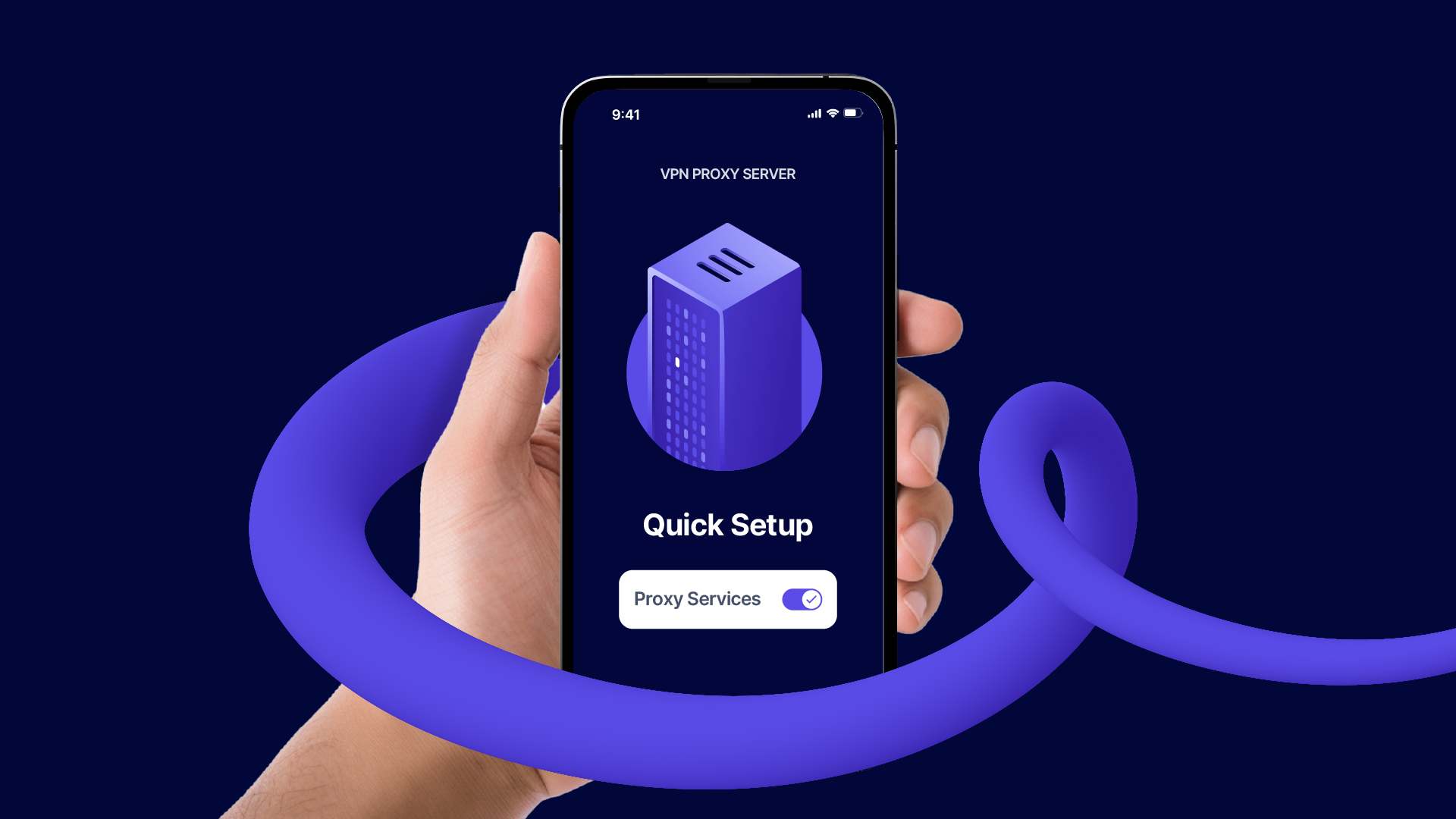
Are you struggling with online security issues? Learn how a proxy server can protect your data, your cryptocurrencies, or your online identity.
In the following article we’re going to tackle several important questions: what is a proxy server, the difference between a proxy server and a VPN, how a proxy server works, how to set up a proxy server quickly, what is a reverse proxy server, and much more.
We’ll even give you a brief tour of some of the top proxy services and how they can help protect your privacy, your identity, and your cryptocurrency transactions.
So, let’s get started.
What is a Proxy Server?
A proxy server is like a virtual gatekeeper that stands between your device and the websites you want to visit.
When you access the internet through an anonymous proxy server, your requests (like visiting a website or downloading a file) are sent to the proxy server first.
The proxy server then forwards these requests to the appropriate destination on the internet. The responses from the internet are sent back to the proxy server, which then delivers them to your device.
How a Proxy Server Works
Here’s a simple explanation of how a proxy server functions:
- Request Sending: When you type a website address into your browser, your request goes to the proxy server instead of directly to the website.
- Request Forwarding: The proxy server takes your request and sends it to the website on your behalf.
- Response Receiving: The website sends the information back to the proxy server.
- Response Forwarding: The proxy server then sends this information back to your device.
Proxy Server vs. VPN
While both proxy servers and VPNs (Virtual Private Networks) help protect your privacy online, they work differently and offer different levels of security and functionality.
Proxy
A proxy server acts as a middleman between your device and the internet. Its primary function is to hide your IP address, providing a layer of privacy by making your online activities appear as if they are coming from the proxy server instead of your device.
Proxy servers can be set up for specific applications, such as a web browser, which allows you to control which parts of your internet usage go through the proxy.
However, proxy servers generally do not encrypt your data, meaning that while they can help with privacy, they do not provide a high level of security against eavesdropping.
VPN
On the other hand, a VPN creates a secure and encrypted connection between your device and the internet.
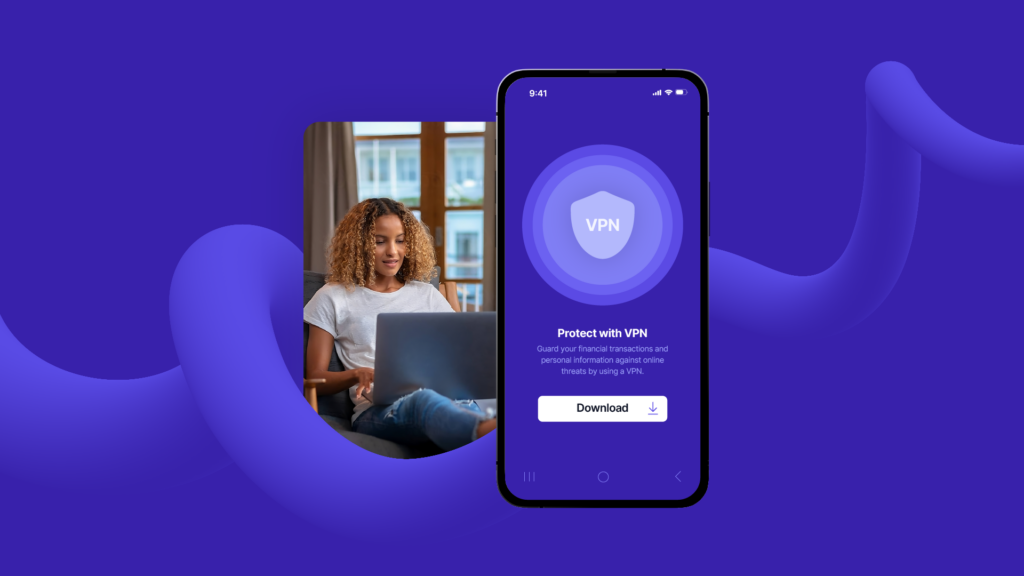
Like a proxy server, a VPN hides your IP address, but it also goes a step further by encrypting all of your internet traffic.
This lack of an identifiable IP address provides a much higher level of security, protecting your data from potential hackers or surveillance.
Additionally, a VPN routes all of your internet activities through the VPN server, not just specific applications, ensuring that all of your online actions are secure and private.
Check out this guide if you want to learn how to set up your VPN connection and what VPN service to choose.
What’s a Reverse Proxy Server?
A reverse proxy server is a type of server that sits between the internet and a group of servers, acting as a middleman to manage and distribute incoming traffic.
Unlike a regular proxy server that forwards your requests to the internet, a reverse proxy server takes requests from the internet and forwards them to the appropriate server in its network.
Example:
Imagine you have a popular website that gets a lot of visitors every day. To handle all these visitors without slowing down, you have a bank of servers running your website.
Instead of visitors directly accessing these servers, you use a reverse proxy server.
When someone visits your website, their request goes to the reverse proxy server first. The reverse proxy then decides which of your servers is the best one to handle the request and forwards it there. This helps balance the load, improve performance, and add an extra layer of security.
For instance, if you run an online store, a reverse proxy server can make sure that even during busy times, like a holiday sale, your site runs smoothly by distributing the traffic efficiently across multiple servers.
How to Set Up a Proxy Server Quickly
When setting up a proxy server, the first step is to choose a reliable proxy service provider.
A good tip is to look for providers that offer good speed, strong security, and dependable customer support. It’s also important to consider the types of proxies they offer (like residential or data center proxies) and whether they have servers in locations that meet your needs.
Setting up a proxy server is easier than you might think. Follow these simple steps to get started:
- Select a Proxy Server: After choosing your provider, pick the proxy server that best suits your needs. This could be based on location, speed, or type of proxy.
- Configure Your Browser or Device: Once you have your proxy server details, you’ll need to configure your browser or device to use the proxy. This usually involves going into your browser’s settings, finding the network or connection settings, and entering the proxy server information provided by your service provider.
- Verify the Connection: After setting up the proxy, it’s important to verify that it’s working correctly. You can do this by visiting a website that shows your IP address. If everything is set up properly, you should see the IP address of the proxy server instead of your own.
By following these steps, you’ll be able to set up a proxy server quickly and start enjoying the benefits of a secure IP address, enhanced privacy, and access to restricted content.
Here are some trusted providers you might consider:
Proxy-Cheap
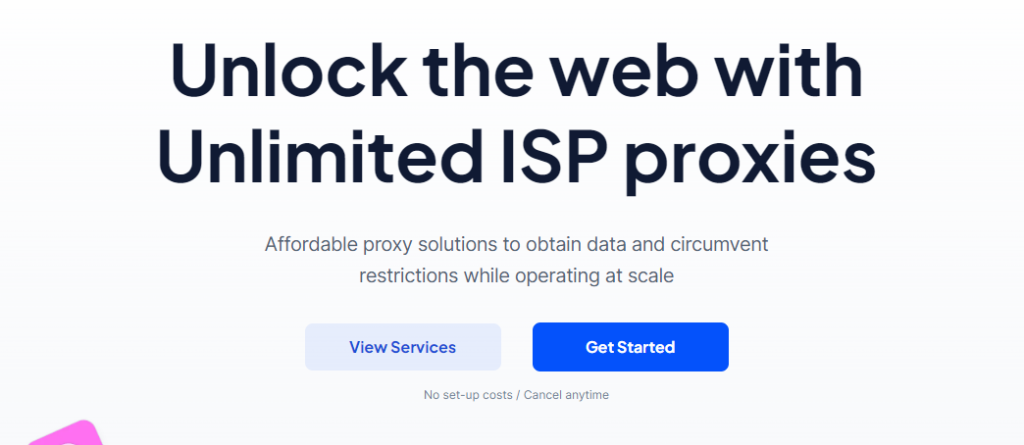
Proxy-Cheap offers a variety of proxy services tailored to different needs such as ad verification, brand protection, data scraping, market research, and social media management, demonstrating its understanding of diverse user requirements.
The service provides a large number of IPs across various geolocations, making it ideal for bypassing geographical restrictions and accessing localized content. This is crucial for tasks like market research and SEO. Proxy-Cheap offers several types of proxies, including Static Residential, Datacenter IPv4/IPv6, Rotating Residential, Mobile, Rotating ISP, and Residential VPN proxies, each suited for specific tasks.
For example, static residential proxies are stable for long-term use, data center proxies offer high-speed connections, and mobile proxies are suited for mobile-centric tasks.
The service also features unlimited bandwidth, eliminating concerns about usage limits or extra charges, which is beneficial for high-volume tasks. Additionally, Proxy-Cheap accepts cryptocurrency payments via CoinGate, aligning with the trend of crypto adoption and offering a secure, private payment method.
Geonode
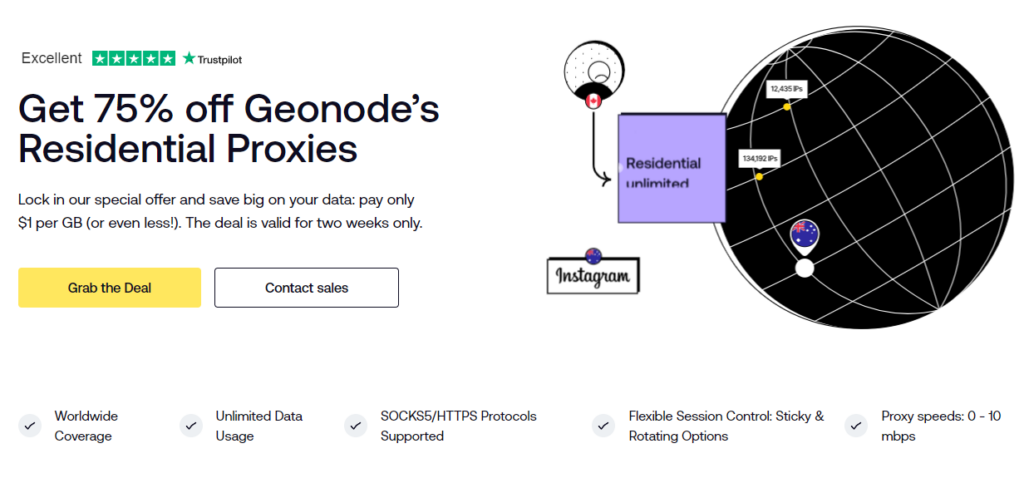
Geonode is a proxy service that supports high-bandwidth activities like web scraping APIs with its unlimited bandwidth capacity.
It offers a variety of packages, including unlimited residential proxies for extensive data scraping and pay-as-you-go options for more controlled usage. Geonode’s rotating proxies come from peer-to-peer networks and support multiple protocols such as SOCKS5, SOCKS, and HTTP(S), making them flexible and compatible with various applications.
The service helps enhance user anonymity by masking true IP addresses, which reduces the risk of being blocked or tracked by websites.
Geonode’s substantial proxy pool includes over 30 million proxies across 140 countries, ensuring global coverage and access. It offers features like sticky ports for consistent IP sessions lasting from 5 to 60 minutes, sophisticated targeting capabilities down to city or ISP levels, and advanced options like JavaScript rendering for dynamic web applications.
The pricing structure is designed to suit various needs and budgets, offering unlimited proxy access, cost-effective shared data center proxies, and a pay-per-concurrent-request model to scale operations without unexpected costs. A $7 trial allows new users an affordable start with up to 25 threads.
Froxy
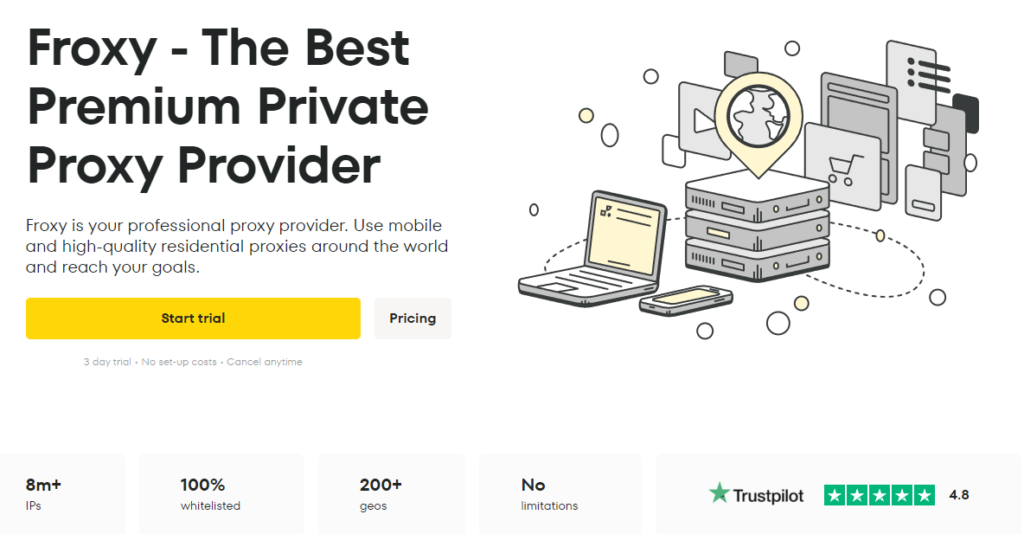
Froxy stands out with its unique pool of white IPs in the Fast Proxies package, ideal for bypassing strict network restrictions. IP whitelisting is a type of security measure that is used to restrict unauthorized access to a system or network.
The proxy network spans over 200 locations worldwide, offering more than 8.5 million IPs, providing users with extensive options for geo-restriction bypassing and web scraping.
The automatic IP rotation in the Fast Proxies package helps users maintain a low profile and avoid being blocked, while the login/password authorization enhances security.
Froxy’s Residential Proxies offer city/provider targeting and support for HTTP and SOCKS 5 protocols, allowing for precise geographical or network-specific proxy usage. The Mobile Proxies feature a 3G/4G network, providing high-speed connections and the ability to bypass CAPTCHAs and blocks, which is beneficial for data collection and web scraping.
Froxy also supports various payment methods, including cryptocurrencies like Bitcoin, Ethereum, and Litecoin and more via CoinGate.
Ghostealth
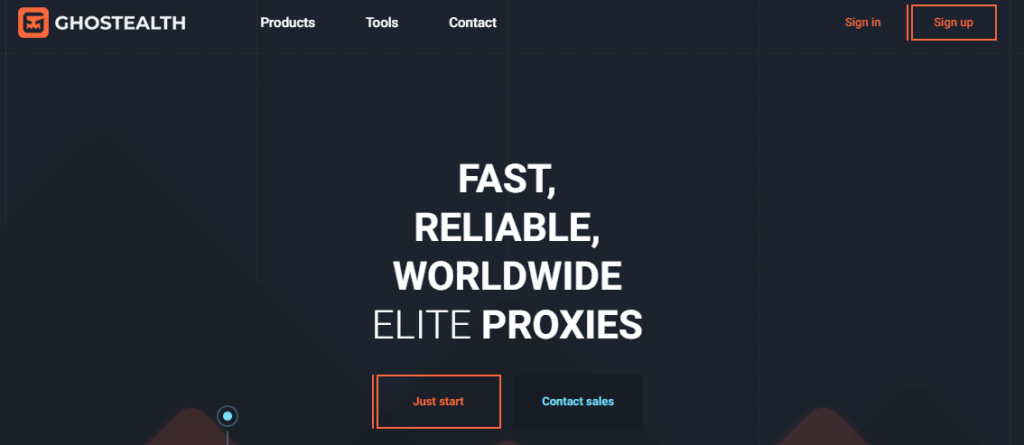
Ghostealth processes up to 10 million requests daily with a 99.9% uptime, ensuring reliable service 24/7.
Its servers respond in less than 500 milliseconds, providing fast and continuous access.
The rotating data center proxies offer high-speed internet connections suitable for tasks like SEO monitoring, ad verification, and brand protection.
With unlimited bandwidth and fast reaction times, these proxies support extensive use across multiple countries without sacrificing speed or reliability. If a proxy fails, it is promptly replaced to maintain service continuity.
Plus, Ghostealth also offers a free proxy scraper tool that finds and sorts available proxy servers by criteria like country, speed, and protocol, providing a useful resource for non-critical needs.
The datacenter proxies guarantee download speeds of at least 100 Mbps, ensuring quick page loads and high-level anonymity, making it difficult to trace user activity back to their home connection.
Ghostealth’s pricing plans start at $20.00 per week for beginners and go up to $140.00 per week for expert users, catering to all levels of need. Payment Options include VISA, MasterCard, and cryptocurrencies via CoinGate.
Decodo
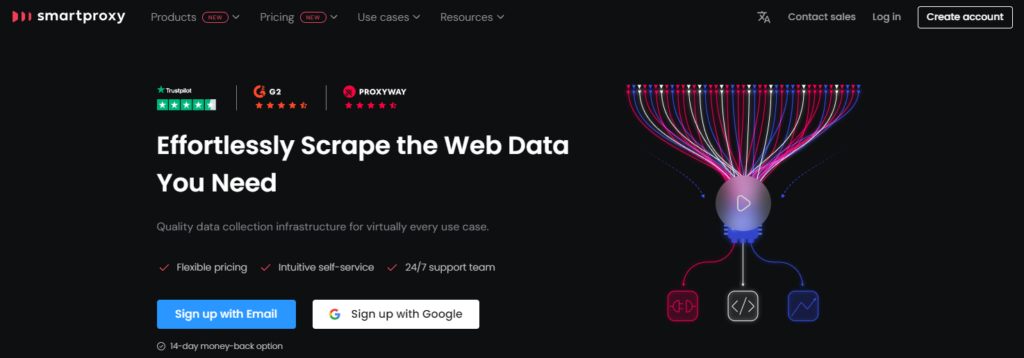
Decodo offers competitive pricing and specialized features for various online tasks.
The eCommerce Scraping API starts at $1.1 per 1,000 requests, allowing users to extract data from eCommerce sites affordably. The No-Code Scraper, at $3.85 per 1,000 requests, simplifies web scraping for those without technical skills.
The SERP Scraping API and Web Scraping API are designed for search engine results and general web scraping, making data collection easy and cost-effective.
Decodo also provides free tools to enhance user experience, such as the X Browser and browser extensions for Chrome and Firefox, which help manage multiple browsing profiles and integrate proxy services. The Proxy Checker and Address Generator test proxy functionality and generate addresses, optimizing user workflow.
The service is supported by comprehensive resources and dedicated support, including detailed documentation, a public API, FAQs, blogs, and webinars, to help users maximize their proxy solutions.
Decodo helps users enhance their online operations, providing the necessary tools and support for efficient and secure web navigation, data collection, market analysis, and online presence management.
Decodo can be purchased using cryptocurrencies (Bitcoin, Ethereum, Litecoin) via the CoinGate payment platform.
Types of Proxy Servers
Forward Proxy
A forward proxy is a server that sits between your device and the internet. When you make a request, like visiting a website, the request first goes to the forward proxy server. The proxy then sends the request to the website on your behalf and returns the response to you. This type of proxy is useful for enhancing privacy, bypassing geo-restrictions, and filtering internet traffic.
Reverse Proxy
A reverse proxy is a server that sits between the internet and a group of servers. When a user makes a request to a website, the request first goes to the reverse proxy. The reverse proxy then forwards the request to the appropriate server in its network. This helps distribute the load, improve performance, and add an extra layer of security by hiding the details of the servers behind it.
Transparent Proxy
A transparent proxy is a server that intercepts your requests without modifying them. It does not hide your IP address or provide any privacy. A transparent proxy is mainly used for caching content to speed up access to frequently visited websites and for filtering content to enforce company or network policies.
Anonymous Proxy
An anonymous proxy is a server that hides your IP address from the websites you visit. It provides a higher level of privacy by ensuring that websites cannot track your browsing activities back to your real IP address. This type of proxy is useful for maintaining online anonymity and protecting your personal information.
Use Cases of Proxy Servers
Personal Use
Individuals can benefit greatly from using anonymous proxy servers in several ways. One major advantage is enhanced privacy.
When you browse the internet through a proxy server, it hides your real IP address, making it harder for websites and advertisers to track your online activities. This can help protect your personal information and maintain your anonymity online.
Another common use of proxy servers is for bypassing geo-restrictions that come with a fixed IP address.
Sometimes, certain websites or online services are only available in specific countries that are identified by your IP address. By using a proxy server located in a different country, you can access content that would otherwise be restricted in your region.
For example, if a video streaming service is only available in the United States, you can use a US-based proxy server to watch the videos from anywhere in the world.
Business Use
Businesses also use proxy servers for a variety of important tasks.
One key use is market research. Companies often need to gather information from multiple websites to understand market trends and competitor strategies.
By using web servers, they can scrape data from these websites without revealing their identity, preventing competitors from detecting their research activities.
Security is another critical reason businesses use proxy servers. Proxy servers can act as a buffer between the internet and a company’s internal network, protecting sensitive data from external threats.
They can also help filter out malicious websites and block harmful content, reducing the risk of cyber attacks.
Additionally, proxy servers help businesses manage large amounts of web traffic efficiently. For example, during a big online sale, a company’s website might experience a sudden surge in visitors. A proxy server can distribute the traffic evenly across multiple servers, ensuring that the website remains fast and responsive for all users.
Conclusion
In this article, we’ve covered what a proxy server is and how it works. We explored the different types of proxy servers, including forward proxies, reverse proxies, transparent proxies, and anonymous proxies, each with its own unique benefits and uses.
We also discussed how to set up a proxy easily and quickly, how to use proxy servers for enhanced privacy and accessing restricted content, and how businesses can use them for market research, security, and managing web traffic.
For reliable service, be sure to check out our recommended proxy providers that employ CoinGate to accept crypto: Proxy-Cheap, Froxy, Geonode, Ghostealth, and Decodo. Each one offers a variety of options to meet your needs and ensure a smooth and secure online experience.
Accept crypto with CoinGate
Accept crypto with confidence using everything you need in one platform.

